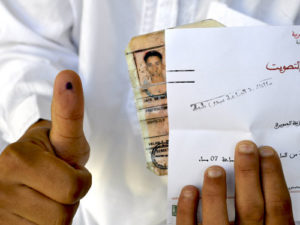 Yesterday, Moroccans went to the polls for the first parliamentary elections after the Constitutional referendum earlier this summer. As I mentioned last week, there would be three questions to answer after the elections, so let’s see
Yesterday, Moroccans went to the polls for the first parliamentary elections after the Constitutional referendum earlier this summer. As I mentioned last week, there would be three questions to answer after the elections, so let’s see
1) What was the turnout?
The official figure is 45%, which is definitely decent. (). The big fear was that low voter turnout would mean that Moroccans were not truly behind the recent Constitutional reforms. However, this turnout is higher than the last parliamentary elections in 2007 (37%), so, while it would be great if it was higher, this turnout does signal that Moroccans ARE increasingly becoming more a part of the democratic process.
2) Was it peaceful, free/fair/transparent?
The official elections observers have yet to come out with their report (I’m waiting to see what the National Democratic Institute has to say.) But, from all I have heard from official and unofficial sources, in the US and Morocco, everything went fairly smoothly, with some small isolated incidents between clashing party supporters/campaigners. One party, PJD, has alleged fraud and irregularities
3) Did the Islamists win?
Yes, this is the biggie and, it appears that, yes, they won. Who are “they”? Morocco’s Justice & Development Party (PJD) (For more about them, check out my last post.) And they apparently won big. This morning, the Minister of Interior announced that they had won 80 seats, nearly double the number of seats they held previously, making them the party with the most seats in the new Parliament.
So, what does this mean? Well, under the new Constitution, the King must appoint a Prime Minister from the party that won the most seats, which means that Morocco will most likely have an Islamist PM. (The Sec. Gen of the PJD has already said that he is willing to compromise and work with others in Parliament to form a strong coalition.
Of course, what’s more interesting is what this will mean for Morocco and how does it changes (or not) the vision of the King and Moroccans on how they move forward, progress and increase democracy. As someone with a professional and personal interest in Morocco, my first worry last night was that an Islamist –led Parliament would mean that there would be an attempt to roll-back many of the reforms that have set Morocco apart over the last decade, most notably in the areas of women’s rights, religious tolerance and interfaith dialogue and greater international cooperation and involvement. But then, I remembered that these unprecedented strides didn’t come about because of a particular political agenda. Rather, they were the result of a national consensus, led by the King, to move forward. These changes did NOT come without debate, great controversy and compromise. I believe these changes transcend political affiliations and are a part of a modern, Morocco that all parties, groups, ideologies, etc in the country wanted to see and are not considering “turning back.”
It is also interesting to note that the PJD made its announcement claiming victory to international reporters before even semi-official results were in. (According to many on Twitter, this was hasty and a bit odd.) But I think it is a real reminder that the PJD realizes that the world is watching. Is there such thing as a moderate Islamist party and would such a leadership conflict with principles of increased democracy? This is one of the major questions of the Arab Spring.
It’s also clear that the world is watching because what’s happening in Morocco is such a contrast from the events in Tahrir Square. As Egypt prepares to go to the polls on Monday, under MUCH different circumstances, this question of Islamists as democrats? will be raised again.
Of course, Morocco isn’t Egypt for many reasons and, even Moroccans, would shun such a comparison or suggestion that Egypt could take a page from Morocco’s book. But, what is happening in Morocco is proof that, if done correctly, with input and buy-in from all parts of society, and an open space for debate and dialogue, democracy is not only “possible” in the Arab world, but it’s what the voting citizens in the region are calling for.
Even though yesterday’s vote represents a major accomplishment in Morocco, it’s only the beginning. The real question will be how the new Parliament will form its new government and assume its new, more powerful role AND if the Moroccan people will truly hold their elected officials accountable.
Just before the elections, I was listening to a Moroccan radio call-in show about the elections and, when asked if she would boycott, a caller said, “I’m seriously considering it. Not because I don’t love my country…I do. But we have a system that works, even with its flaws. I’d rather have a monarchy that works than a democracy that might not.”
Amen, sister.